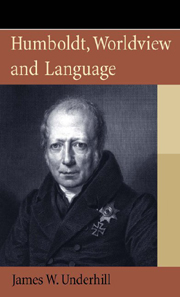Book contents
4 - Boas
from Part I - Language and World
Published online by Cambridge University Press: 12 September 2012
Summary
It is difficult for us to appreciate today the importance of Franz Boas' Handbook of American Indian Languages, with its groundbreaking introduction in which he made a serious philological effort to present the complexities and subtleties of Amerindian languages to an audience which was inclined to believe that the thought, culture and language of these diverse peoples reflected a primitive state of evolution. Boas wrote his Handbook back in 1911, more than twenty years before the Nazis attempted to exterminate what they felt to be a race of Untermenschen. And he was writing in opposition to what was considered to be a perfectly respectable linguistic tradition incarnated by August Schleicher, the nineteenth-century philologist (1821–1868) who pushed the organic representation of language to an extreme form when he claimed that while some languages were advanced, there were, in contrast, primitive forms, such as those found in North America, which were wholly ‘inapt for historical life’ because of the excessive abundance of their forms (Hagège 2000: 28). According to Schleicher, such languages were destined to go into regression and would finally become extinct. To Schleicher this was only natural: primitive languages, as a like-minded linguist, Hovelacque, argued (Hagège 2000: 34, mT) ‘perished in the pitiful struggle for survival.’ Linguists of the time were eager to adopt the organic determinism of Social Darwinism and formulated ideas on the development of language and linguistic change within the prism of evolutionary theory.
- Type
- Chapter
- Information
- Humboldt Worldview and Language , pp. 20 - 24Publisher: Edinburgh University PressPrint publication year: 2009



